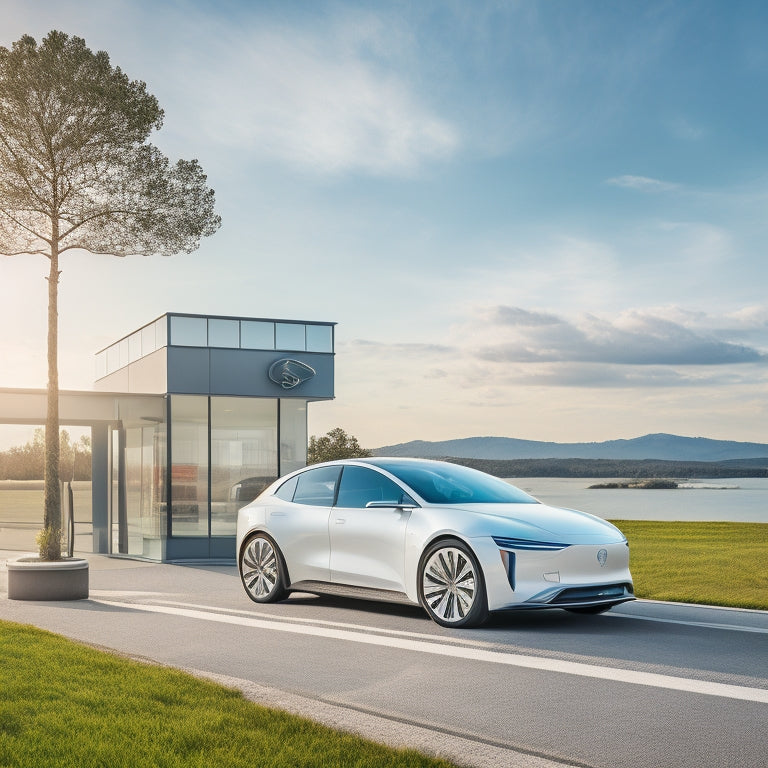
Electric Car Guide Unveiled: Buying Tips Inside
Share
You're about to make a significant leap into the world of electric vehicles, and with the right guidance, you'll be maneuvering through the market like a pro. To start, consider top electric vehicle models like the 2023 Hyundai Ioniq 5, which boasts a 303-mile range on a single charge. Think about performance ratings, efficiency comparisons, and design features like aerodynamic lines and spacious interiors. As you explore ownership and charging essentials, factor in public charging stations, home charging options, and charging speed. Next, examine buying options and incentives, including financing choices, tax credits, and state utility programs. Now, get ready to take your electric car search to the next level.
Key Takeaways
• Research top electric vehicle models, considering performance, range, and features like design, infotainment systems, and regenerative braking.
• Understand charging infrastructure implications, including public and home charging options, charging speed, and impact on ownership costs.
• Evaluate buying options and incentives, such as financing, tax credits, and state and utility programs to offset the sticker price.
• Compare charging options, including Level 1, Level 2, and DC Fast Charging, considering cost and speed for practicality.
• Factor in available rebates and discounts to make a cost-effective purchase, and research financing options that fit your budget.
Top Electric Vehicle Models
You're likely researching the top electric vehicle models, and for good reason - with so many options available, finding the right one can be overwhelming.
When narrowing down your choices, take into account performance ratings and efficiency comparisons. The 2023 Hyundai Ioniq 5, for instance, boasts an impressive range of 303 miles on a single charge.
Design features, such as sleek aerodynamic lines and spacious interiors, are also essential to ponder. Technology updates, like advanced infotainment systems and regenerative braking, can greatly enhance your driving experience.
Ownership and Charging Essentials
As you prepare to own an electric vehicle, understanding the charging infrastructure and its implications on your daily routine becomes essential. You'll need to take into account the charging network, including public charging stations, home charging options, and your vehicle's charging speed. This will impact your ownership costs, including fuel savings and potential charging fees.
| Charging Option | Charging Speed | Cost |
|---|---|---|
| Level 1 (120V) | 4-5 miles/hour | Free (with vehicle purchase) |
| Level 2 (240V) | 20-25 miles/hour | $500-$1,000 (installation) |
| DC Fast Charging | 60-100 miles/30 min | $5-$10 per session |
Buying and Incentive Insights
When shopping for an electric vehicle, it's essential to explore the various buying options and incentives available, which can greatly impact the overall cost of ownership.
You'll want to examine financing options that fit your budget, as well as tax credit benefits that can help offset the sticker price. For instance, the Federal EV Tax Credit can provide up to $7,500 in savings.
Additionally, many states and utilities offer incentive programs, such as rebates and discounts, to encourage EV adoption. Be sure to research these programs and factor them into your buying decision.
Frequently Asked Questions
Can I Charge My EV in the Rain or Wet Conditions?
Imagine pulling into a charging station on a rainy day, wondering if you can plug in safely. Yes, you can charge your EV in the rain or wet conditions, thanks to waterproof outlets and specially designed charging stations that guarantee safe and reliable rainy day charging.
How Do I Secure My EV Charging Cable From Theft?
You can secure your EV charging cable from theft by using cable locks or immobilizers, raising public awareness about the issue, and being mindful of your charging habits to minimize opportunities for theft.
Can I Tow an Electric Vehicle if the Battery Is Dead?
As you're stranded on the roadside, darkness closing in like a shroud, you wonder: can I tow my EV with a dead battery? Yes, but exercise extreme caution, ensuring Towing Safety, and consider Roadside Assistance for a safe and secure rescue.
Are Electric Vehicles More Prone to Rust?
You might wonder, are electric vehicles more prone to rust? Not necessarily, as most EVs feature rust-resistant coatings and electric frames designed to minimize corrosion, ensuring a longer lifespan for your eco-friendly ride.
Can I Convert My Gas-Powered Car to an Electric Vehicle?
Did you know that 75% of EV owners charge their vehicles at home? When considering converting your gas-powered car to an electric vehicle, be prepared for significant Conversion Costs, ranging from $10,000 to $20,000, and research Electric Upgrades, like new batteries and motors, to guarantee a successful shift.
Related Posts
-

What Do Power Strips Do for Standby Energy?
You're likely aware that your devices, such as TVs and computers, continue to draw power even when turned off, a phen...
-

10 Best Energy-Efficient External Hard Drives for Sustainable Offices
When it comes to sustainable offices, you need external hard drives that balance data storage needs with energy effic...
-

10 Powerful Electric Mowers for Expansive Lawns
You're moving away from gas-powered mowers and exploring electric options for your expansive lawn. You'll find that h...


